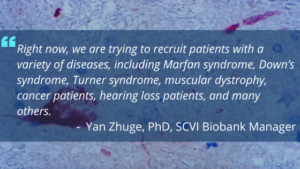Banking, which includes the saving and loaning of resources for one’s own and others’ benefits, has a known history of over 4,000 years. Biobanking continues this historical framework, but within modern medical research. Important for large population studies, genomics, and the advancement of personalized medicine, the use of bio-repositories has led to increasingly important healthcare advances in many medical disciplines, especially cardiology.

The Stanford Cardiovascular Institute Biobank (SCVI Biobank) opened its doors in 2014 with the goal of preserving “…patient specific, de-identified human induced pluripotent stem cell (iPSC) lines….[that] cover a broad spectrum of cardiac diseases, healthy controls, and non-cardiac disease controls”. Founded by the Director of the Stanford Cardiovascular Institute, Joseph C. Wu, MD, PhD, the biobank is a growing library of cell samples that is shared with researchers throughout the world to advance their scientific discoveries.
Click to read more.
